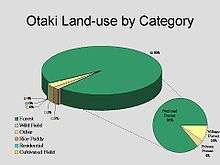Ōtaki, Nagano
| Ōtaki 王滝村 | |
|---|---|
| Village | |
|
Ōtaki village hall | |
 Location of Ōtaki in Nagano Prefecture | |
 Ōtaki Location in Japan | |
| Coordinates: 35°49′N 137°33′E / 35.817°N 137.550°ECoordinates: 35°49′N 137°33′E / 35.817°N 137.550°E | |
| Country | Japan |
| Region |
Chūbu Kōshin'etsu |
| Prefecture | Nagano Prefecture |
| District | Kiso |
| Government | |
| • Mayor | Hiroshi Seto |
| Symbols | |
| • Tree | Hinoki cypress |
| Time zone | Japan Standard Time (UTC+9) |
| City hall address |
3623 Kamijo, Ōtaki-mura, Kiso-gun, Nagano-ken 397-0201 |
| Website |
www |
Ōtaki (王滝村 Ōtaki-mura) is a village located in Kiso District, Nagano Prefecture, Japan.
History
- 1504: There remains a record of Ōtaki being established at this time as part of the Chikuma Region of Shinano
- 1868: Takigoshi Village (滝越村)is incorporated as part of Ōtaki.
- 1871: With the abolition of feudal domains and the establishment of prefectures, Ōtaki becomes part of Nagoya Prefecture, but is amalgamated, along with other prefectures, in November of that year to become part of Chikuma Prefecture.
- 1876: The section of Chikuma Prefecture where Ōtaki is located becomes part of Nagano Prefecture, thus becoming Ōtaki Village, Chikuma District, Nagano Prefecture.
- -1917: Construction begins on the Ōtaki forest railroad (王滝 森林鉄道)
- June 30, 1975: The Ōtaki forest railroad is decommissioned with the last run of the "Yamabato" train.
- May 1, 1968: The Chikuma District has its name changed to its current "Kiso District".
- 1979: Mt. Ontake erupts.
- September 14, 1984: Nagano Western Earthquake causes a section of Mt. Ontake to crumble and flow into the Ōtaki Valley. 29 people are reported dead or missing and 87 homes are destroyed.
Present-day Ōtaki
At present Ōtaki's land area is 310.86 km2 of which 295.85 km2 (95%) is forestland; 86% of which is designated national forest. This is a pattern that has developed over time starting in the 16th century when a large majority of forestland in the Kiso Valley was claimed by Toyotomi Hideyoshi, in part to build his castle at Inuyama.
Demographically, Ōtaki is undergoing drastic changes. The population structure of Ōtaki is similar to that found in rural areas across Japan; a rising elderly population coupled with a decline in overall population. Ōtaki’s population currently stands at 995, down from 1,768 in 1980. During this same period the rate of elderly residents has risen to 32.4%. Though tourism remains the primary industry in Ōtaki, tourist numbers (including skiers and worshipers) have declined in recent years. After tourism, manufacturing jobs are the most prevalent, followed finally by agriculture. On the ground, this pattern takes the form of elderly residents engaging in agricultural work, while younger family members (if any remain in the village) work outside of the home.
Ōtaki is struggling economically, due in large part to public debt accrued through the building and management of Ontake 2240 ski hill. For 2008 roughly 3/4 of Ōtaki’s annual budget is slated for administrative and financial operations, with almost a quarter of this being used to pay back public debt. This leaves only a fraction of funds for use in providing basic services such as sanitation, health, and education. Major cuts have been made to the salaries of village employees and to money spent social, cultural, and educational activities.
External links
 Media related to Ōtaki, Nagano at Wikimedia Commons
Media related to Ōtaki, Nagano at Wikimedia Commons- Ōtaki official website (Japanese)
- In The Pines blog about Ōtaki (English)
